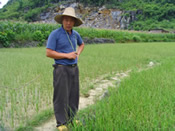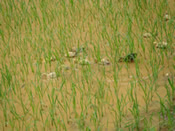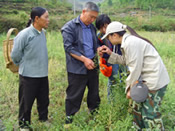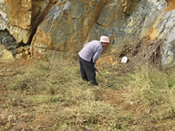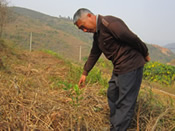
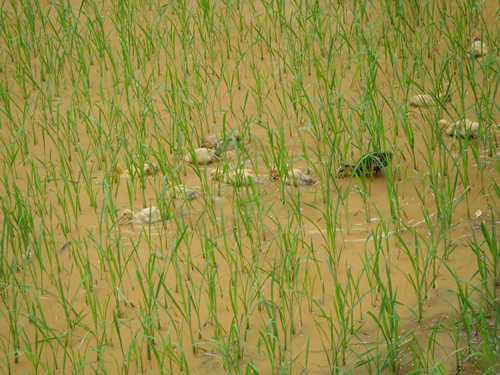 |
| Raising ducks in the paddy field. |
By Wang Jian (Assistant Programme Officer, Guangxi Office, PCD)
Many people who want to practice ecological agriculture are concerned about market risks. They worry about their livelihood, especially when their sales fall short of their expectations. However, in the village of Shannadongtun in Guangxi’s Fengshan County, there is an ecological farmer whose produce is welcomed by the market. His persistence in the pursuit of his ideals has also brought him happiness. His name is Zhang Mianchun, and his perseverance has also influenced others who are turning to ecological farming to make a living.
“A pig can only grow this big. If it is forced to grow bigger, think whether you can eat its meat.”
The relationship between Zhang Mianchun and ecological agriculture began when he was raising pigs. In the 1990s, as his children began to go to school and the family needed more income, Zhang decided to expand his pig farm. At that time many people used chemical feed sold in the market. The pigs grew fast and well. Zhang, however, refused to use chemical feed, sensing that chemicals were not good. “Just think, a pig can only grow this big. If it is forced to grow bigger, think whether you can eat its meat.”
After ruling out chemical feed, Zhang had to solve the problem of finding an alternative food source. What could it be? Cat beans (velvet beans) came to mind. He remembered that during the period of collective economy, there was a kind of plant called 'cat bean' that the older generation of people used to feed pigs. However, processing the cat beans was a painstaking endeavour that required special tools. Because of this, after the household contract system was established, most households gave up processing cat beans and very few people continued to grow them. Soon even the seeds were nowhere to be found. If Zhang wanted to revive the practice of feeding pigs with cat beans, he would have to grow them first. To grow them, he would have to find the seeds. So he searched for seeds, and his effort paid off. He found them in a village more remote than Shannadongtun.
Zhang started to grow cat beans again, and bought a new set of tools for cat bean processing. Cat bean meal, maize flour, soybean meal and bone meal were mixed in a certain proportion to produce home-made pig feed. Maize, soybeans and cat beans were home-grown while fish, pig and cattle bones were sourced from other people. Zhang found that the pigs raised on home-made feed grew just as well as those given chemical feed, and their meat actually tasted much better.
Consumers love pigs fed on home-made feed. At the market, Zhang was always the first to finish selling his pork. When he did not have the time to go to the market, butchers would come to buy pigs from him and the price they offered was often about 30 to 50 cents higher per catty than that offered to other farmers. Zhang’s pigs became famous and his name became a brand name. People came all the way from Fengshan, the county seat, to buy pork from him. Other butchers were jealous of him and some even used his name when they sold pork from other farmers.
Reminiscing on the years of pig farming, Zhang reckoned that it was thanks to this successful experience that he gained trust in the ecological approach. Now he has less pigs but he continues to grow cat beans because he wants to save the seeds.
“When they saw other people applying pesticides, they followed because they were afraid that if they did not do so, they would not be able to make a living. After all these years of seeing me making a living without applying pesticides, they are gradually applying less.”
In 2004, Zhang met PCD staff who were conducting programmes on sustainable living and on ecological protection and sustainable agriculture in Fengshan in collaboration with the School of Agriculture of Guangxi University. The programmes aimed to advocate ecological health. Through these programmes, PCD introduced conventional rice varieties[Note 1] to local farmers and experimented with ecological farming methods such as composting and cultivating green manure. Shannadongtun Village, of which Zhang was the village team leader, was one of the programme sites. Zhang met the programme staff frequently and regarded them as his soul-mates in ecological agriculture. He also became more confident about ecological farming, and decided to give up using chemical fertiliser and pesticide. However, all the paddy fields of the village were concentrated in the same area. If Zhang was the only farmer not applying pesticide, his paddy field would end up with all the insect pests. He felt helpless. In those years, the villagers applied pesticides as frequently as once a week. There was a jingle that said: “Kill any bug there is, treat any disease there is; keep away bugs even if there are none, keep away disease even if there is none.” In order to have a harvest, Zhang was forced to apply pesticides, but he did this much less frequently than the others – once every 20 days or more.
Not being able to practice ecological farming at the large paddy fields, Zhang turned to his own paddy field near home. His was the only paddy field in that area. Because of his inexperience, he put down a lot of farm manure in place of chemical fertiliser, only to find that it was bad for the crops as well. “The land is the same as we human beings. She cannot eat too much. Restraint should be practiced,” he said. His own paddy field has not had chemical fertiliser or pesticides for many years and it has now become a well known site in the village. Many people who pass by look at it and start to think. Gradually some people have begun to change. “When they saw other people applying pesticides, they followed because they were afraid that if they did not do so, they would not be able to make a living. After all these years of seeing me making a living without applying pesticides, they are gradually applying less.” According to Zhang, some villagers now apply pesticide only twice in a growing season, while others apply only once.
Ideas about the use of chemical fertiliser are also changing. The blind faith in this product gradually weakened when other villagers saw Zhang reaping a healthy harvest without chemical fertiliser. They have also found out for themselves that after applying urea to their land for years, the soil has hardened. Now many villagers have stopped using urea and turned to a compound fertiliser much advertised on television. However, for Zhang farm manure is still the best.
Healthy Food Comes from Healthy Land and a Healthy Way of Farming
There is a very important reason for Zhang being able to persevere in ecological agriculture: he owns a small brick kiln. There are lots of rocks in the area, which can be crushed and mixed with cement to produce bricks. The brick kiln ensures that Zhang has some income, enabling him to continue to experiment with ecological agriculture. Except for salt, his family is completely self-sufficient in food. However, he has not been producing more to supply others. This is because much of his land is now used to grow mulberry trees following the national trend of 'moving silkworm farming from east to west'.
Growing mulberry trees and engaging in silkworm farming has enabled villagers to earn some income. However, some villagers have become unhealthy as a consequence. In 2007, Zhang’s younger brother and sister-in-law had been eating instant noodles every day because they wanted to save time and did not want to cook. After doing this for a year, they earned over RMB10,000. However, their bodies were bloated. They had a health check-up in the hospital and found that the problem was nutritional. In the end they spent more than RMB10,000 for treatment. They had been toiling to no avail. Zhang was very shaken by this incident, and uses it as an example to tell others the importance of healthy food, and that healthy food comes from healthy land and a healthy way of farming.
Zhang’s interest in ecological agriculture has influenced his son, who took the Higher Education Admittance Examination in 2009. His son agreed promptly when Zhang suggested that he should apply at the Fishery and Animal Husbandry School of Guangxi. For Zhang, a village kid should go back to the rural area one day to serve the farmers, cultivate crops and raise animals.
Raising Ducks in Paddy Fields and Growing Fruit Trees based on Natural Farming Methods—Taking More Steps Forward to Practice Ecological Agriculture
“I have nothing to do with chemical fertiliser and pesticides,” says Zhang. Indeed he has given up their use for many years and has been exploring alternative ideas and methods to practice ecological agriculture. He has been looking for old varieties of crops while PCD programme staff have also introduced some conventional varieties of rice. Zhang has completely given up cultivating hybrid rice varieties. He has been growing Baguixiang rice, a conventional variety, in his paddy field for years. He has also been very bold in learning from outside experience. After visiting Heng County where farmers have been raising ducks in their paddy fields, he started to do the same thing in his own paddy field.
At the end of 2012 Zhang heard about 'natural farming'. After he learnt about the ideas behind natural farming, he decided that the soil, water and other conditions of Shannadongtun were unsuitable for growing rice under natural farming, but that growing fruit trees should be fine. Soon he planted a few mandarin trees and used weeds that he cut to mulch around the base of the trees. This was Zhang’s first step in creating an orchard based on natural farming, which changed his attitude towards weeds. He had always thought that weeds beneath the trees would compete with them for nutrition. He would cut the weeds and throw them far way. He now realises that weeds are good for the soil. By mulching around the base of the trees with cut weeds, he stops weeds from growing beneath the trees and helps keep the soil moist. This is particularly advantageous in a karst area which is always short of water. Moreover, when the weeds decay, they add nutrients to the soil. Zhang’s orchard is gradually taking shape. Many villagers who pass by become curious, especially about the weed mulching, and another villager who grows fruit trees has now begun to mulch too.
Zhang Mianchun has been working on the land quietly for years. He never boasts about his work. He simply influences other local farmers with his land and the crops that he grows on it. He “nourishes all creatures quietly,” says a programme staff member who has worked with Zhang for many years.[Note 2] This is also a description of the everlasting wisdom of following the way of nature and allowing nature to nurture all living things.
Note:
- Conventional rice varieties are inbred varieties that have never been cross-bred or genetically modified, the seeds of which can be saved for future cultivation. The seeds have been selected and their purity maintained to ensure that the characteristics of the rice variety remain unchanged.
- Translator's note: this is a line in a poem by Du Fu, a Tang Dynasty poet, in which he sang praise to the rain that falls in spring.


